When the British prime minister stepped out to face the cameras in Downing Street last night to announce that the cabinet backed the withdrawal deal with the EU, the biggest winners were farmers on the island of Ireland and, arguably, across Britain as well.
For the first time since Article 50 – the method whereby a country can leave the EU – was triggered in March 2017, farmers can be certain that their route to market after Brexit will be the same as before.
Political challenge
There is a temptation to think that because we have had a seamless trading relationship on the island of Ireland for over two decades, as well as between Ireland and Britain, that something was always going to be worked out.
If the deal that is agreed by the UK cabinet is approved by Parliament, then that is a valid point. However, there is no guarantee that will happen. Indeed, there is no guarantee that Theresa May will still be leader when the deal is presented to Parliament.
There is considerable political hostility to what has been agreed. For people who wanted full separation from the EU, the deal doesn’t go anywhere near that. For people with a strong pro-EU view, they are also horrified that the UK will be effectively operating as an EU member would but without shaping the rules.
Debate moves to Parliament
Those are the finer political arguments that will be poured over in the lead-up to the vote in Parliament. As for farmers, if this deal goes through Parliament, it will mean business as usual from the spring of 2019.
There is considerable political hostility to what has been agreed
In practical terms, this means that milk can continue coming south for processing, giving the new Lakeland-LacPatrick merger full flexibility in its trade as it has today. It means suppliers in NI to the southern-based co-ops can still sell their milk that way, while Strathroy, the NI dairy, can continue to source milk in the south.
For sheep farmers in the north, their 450,000 or so lambs will be able to come south in 2019, again assuming Parliament ratifies the deal which will be good news for farmers and the marts in the north through which these are sold. The few cattle that still go north will still be able to do so as will the thousands of pigs that move north to Crookston for processing.
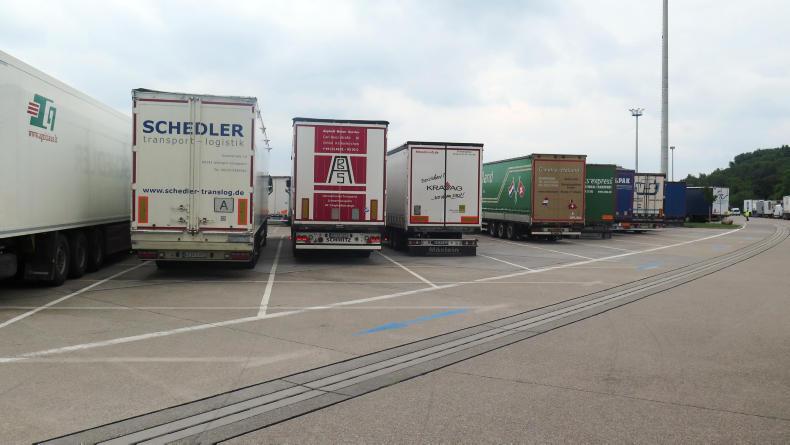
A border crossing for commercial vehicles at the Swiss-German border.
Win-win in Ireland
The benefits won’t be confined to the north.
If there was no deal, there would be an immediate crisis in marketing Irish beef that goes to the UK and a huge problem from dairy in switching away from producing the cheese that is sold in the UK.
For Irish beef, there is no alternative to the UK market and if it closed overnight it would create a tsunami in beef markets in the rest of the EU. This deal, again emphasising it must be approved by Parliament, will avert all that.
Some with strong political objection will suggest that business could have continued anyway through using technology. The reality is that technology will scan vehicles for toll purposes but it doesn’t scan what is inside the vehicles.
For Irish beef, there is no alternative to the UK market and if it closed overnight it would create a tsunami in beef markets in the rest of the EU
The other reality is that the UK deciding to withdraw from the EU in itself creates a border without a specific agreement to align rules and procedures to prevent that.
Irish Farmers Journal visits to the Swedish border with Norway and the German border with Switzerland are evidence that a hi-tech border makes the process extremely smooth and minimises time delays but the bottom line is, it is still a border with all that a border involves.
If the deal approved by the UK cabinet gets approved in Parliament, it will be a good day for farmers and the 13,000 commercial vehicles that cross the Irish border each day.
Read more
UK cabinet backs Brexit withdrawal agreement and no hard border
When the British prime minister stepped out to face the cameras in Downing Street last night to announce that the cabinet backed the withdrawal deal with the EU, the biggest winners were farmers on the island of Ireland and, arguably, across Britain as well.
For the first time since Article 50 – the method whereby a country can leave the EU – was triggered in March 2017, farmers can be certain that their route to market after Brexit will be the same as before.
Political challenge
There is a temptation to think that because we have had a seamless trading relationship on the island of Ireland for over two decades, as well as between Ireland and Britain, that something was always going to be worked out.
If the deal that is agreed by the UK cabinet is approved by Parliament, then that is a valid point. However, there is no guarantee that will happen. Indeed, there is no guarantee that Theresa May will still be leader when the deal is presented to Parliament.
There is considerable political hostility to what has been agreed. For people who wanted full separation from the EU, the deal doesn’t go anywhere near that. For people with a strong pro-EU view, they are also horrified that the UK will be effectively operating as an EU member would but without shaping the rules.
Debate moves to Parliament
Those are the finer political arguments that will be poured over in the lead-up to the vote in Parliament. As for farmers, if this deal goes through Parliament, it will mean business as usual from the spring of 2019.
There is considerable political hostility to what has been agreed
In practical terms, this means that milk can continue coming south for processing, giving the new Lakeland-LacPatrick merger full flexibility in its trade as it has today. It means suppliers in NI to the southern-based co-ops can still sell their milk that way, while Strathroy, the NI dairy, can continue to source milk in the south.
For sheep farmers in the north, their 450,000 or so lambs will be able to come south in 2019, again assuming Parliament ratifies the deal which will be good news for farmers and the marts in the north through which these are sold. The few cattle that still go north will still be able to do so as will the thousands of pigs that move north to Crookston for processing.

A border crossing for commercial vehicles at the Swiss-German border.
Win-win in Ireland
The benefits won’t be confined to the north.
If there was no deal, there would be an immediate crisis in marketing Irish beef that goes to the UK and a huge problem from dairy in switching away from producing the cheese that is sold in the UK.
For Irish beef, there is no alternative to the UK market and if it closed overnight it would create a tsunami in beef markets in the rest of the EU. This deal, again emphasising it must be approved by Parliament, will avert all that.
Some with strong political objection will suggest that business could have continued anyway through using technology. The reality is that technology will scan vehicles for toll purposes but it doesn’t scan what is inside the vehicles.
For Irish beef, there is no alternative to the UK market and if it closed overnight it would create a tsunami in beef markets in the rest of the EU
The other reality is that the UK deciding to withdraw from the EU in itself creates a border without a specific agreement to align rules and procedures to prevent that.
Irish Farmers Journal visits to the Swedish border with Norway and the German border with Switzerland are evidence that a hi-tech border makes the process extremely smooth and minimises time delays but the bottom line is, it is still a border with all that a border involves.
If the deal approved by the UK cabinet gets approved in Parliament, it will be a good day for farmers and the 13,000 commercial vehicles that cross the Irish border each day.
Read more
UK cabinet backs Brexit withdrawal agreement and no hard border




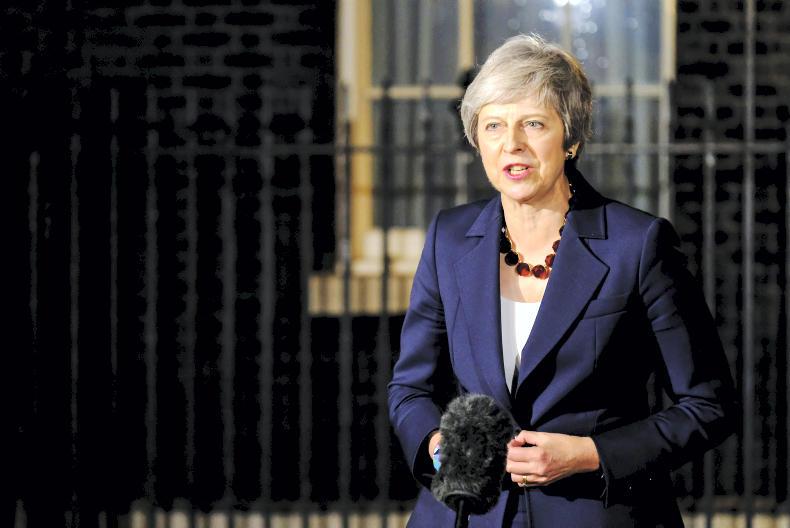


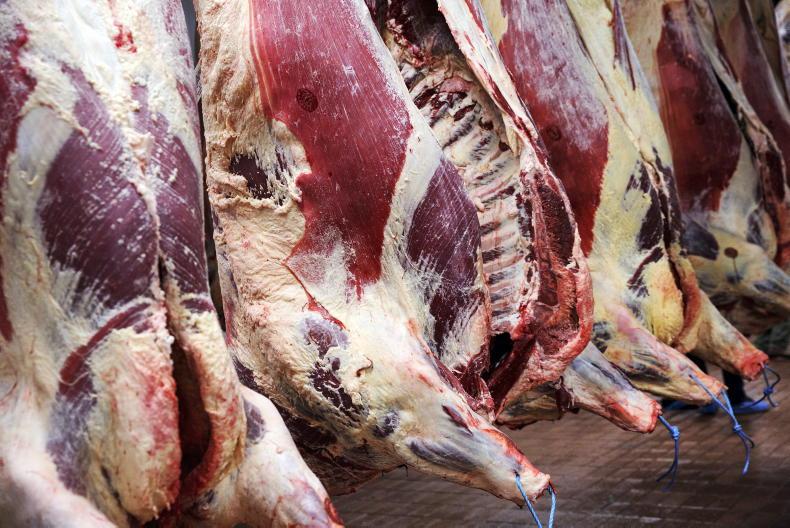

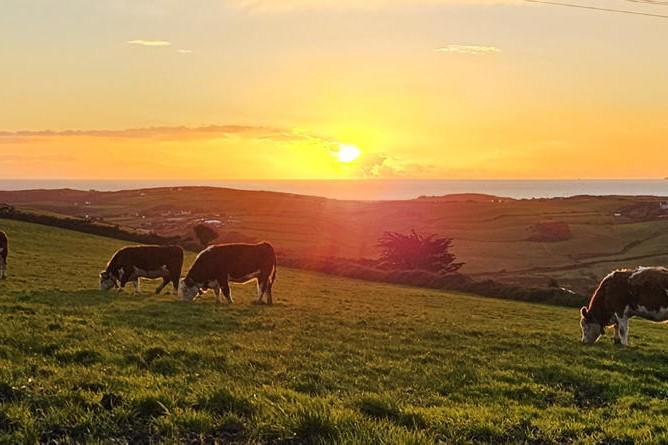
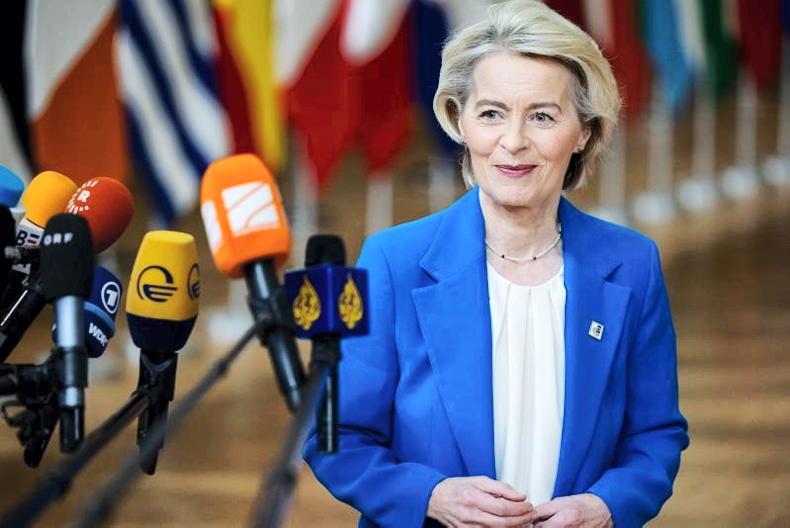

SHARING OPTIONS